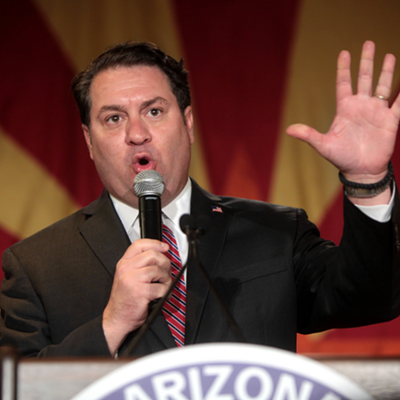TAKING INITIATIVE
With all due respect to the Tucson City Council candidates, even the local bloggers are finding it hard to get excited about this year's city election.But is it too much to ask that we at least have a couple of interesting initiatives to talk about?
We'll see. City Clerk Kathy Detrick, acting on advice from City Attorney Mike Rankin, rejected the Consumer Choice initiative last week after backers had dropped off nearly twice as many signatures than they needed to make the ballot.
Rankin says the initiative, a Wal-Mart-funded effort to ask voters to repeal a portion of the city's big-box ordinance so the mega-retailers can expand their grocery biz, is null and void because "Arizona law is pretty clear that the initiative process can't be used to create or amend zoning law."
Will Wal-Mart challenge the city in court? Well, they certainly couldn't have been surprised by the city's move, because even we'd heard about it weeks ago. For now, Wally-Mart is telling the dailies that it's still considering its options, but the company's political consultant, Pete Zimmerman, said a few weeks ago that the lawyers had told him that they saw it as a restraint-of-trade issue, not a zoning issue.
The second initiative, the Tucson Water Users Bill of Rights, is the brainchild of former state lawmaker John Kromko. It would eliminate the city's $14-a-month garbage fee, block the delivery--or even recharge--of treated effluent and stop new water connections once Tucson Water begins delivering 140,000 acre feet of water annually--which is roughly the annual allotment of CAP water.
The county recorder is now reviewing a random sample of Kromko's 15,400 signatures to determine whether it will make the ballot, with results expected early next week. (There's a chance Kromko could be close enough to force the City Clerk's Office to review every single signature, which sounds nearly as boring as counting Best of TucsonTM ballots.) Kromko needs 11,615 valid signatures from registered city voters to qualify.
Kromko's initiative could also end up in court. Unlike the Arizona Constitution, the city charter has no single-subject rule limiting the subject matter of amendments. But Rankin says there may be a common-law restriction against such a broad-ranging proposition.
Rankin says City Hall isn't currently contemplating legal action against the initiative. But we hear rumblings that the private sector--primarily, the Growth Lobby--is considering a lawsuit.
The gang at Tucson Water is waiting to see if Kromko has enough signatures to make the ballot before doing an analysis of the initiative's impact, according to spokesperson Mitch Basefsky.
But Basefsky can tell us this much: Last year, Tucson Water delivered 127,000 acre-feet of water. And that wasn't a record.
If the voters agree to limit Tucson Water from hooking up any new connections once the utility starts delivering 140,000 acre feet, it might not be long before the taps turn off for future growth.
"It wouldn't be too many years before we reach that," Basefsky says.
EARLY WARNING
One more note about city elections: If you're interested in voting early this year, you can request a ballot by phone by calling 884-VOTE or going online.Or you can just wait until you get a postcard from the City Clerk's Office, which, for the first time, is mailing request forms to every registered voter. All you have to do is fill out the form and mail it back in. In August, your early ballot for the primary will arrive in your mailbox.
City Hall's mailing effort will either make life easier for the political campaigns, or frustrate their efforts to control the process.
A CRAZY SYSTEM
Congresswoman Gabrielle Giffords appears to be growing impatient with Defense Secretary Robert Gates, who hasn't gotten back to her regarding the military mental-health system.From her perch on the House Armed Services Committee, Giffords quizzed Gates about the system back in February. When she hadn't heard back from him more than four months later, she sent a letter reminding him that he was going to send along more information. As of this week, Giffords' office still hadn't heard anything new.
The lack of mental-health treatment is no small problem for soldiers coming home from war. In her letter to Gates, Giffords cites a recent report, "An Achievable Vision," from the Department of Defense Task Force on Mental Health, which bluntly states: "The Military Health system lacks the fiscal resources and the fully trained personnel to fulfill the enhanced requirements imposed during times of warfare."
In an investigative series earlier this year, Chris Adams of the McClatchy Company (publisher of The Miami Herald, among other newspapers) reported that the Department of Veterans Affairs was dealing with greater demand on its counseling services by reducing the number of visits available to veterans. Adams also revealed that the quality and availability of care varied wildly across the country.
In addition, veterans from previous wars are now competing with today's soldiers for mental-health services.
"The return of so many veterans from Iraq and Afghanistan is squeezing the VA's ability to treat yesterday's soldiers from Vietnam, Korea and World War II," wrote Adams. "And the competition for attention has intensified as the vivid sights of urban warfare in Iraq trigger new PTSD symptoms in older veterans."
This is a disgraceful way to treat soldiers who have been damaged by post-traumatic stress syndrome in the service of their country.
REPUBLICANS VS. BUSINESS
Hey, remember that employer-sanctions bill that Gov. Janet Napolitano signed last week? And how there was some hope that having a legislative version might derail state Rep. Russell Pearce's effort to put an even more draconian version on the 2008 ballot?Didn't work. Pearce and his buddy Don Goldwater are pushing ahead with their one-strike-and-you're-out proposition. They told Howie Fischer of Capitol Media Services that they just didn't trust lawmakers not to monkey with the new law in a special session. Napolitano, for example, has suggested that maybe we don't want to shut down power plants, hospitals or nursing homes. But hey, what's a summer blackout compared to finally cracking down on those damned illegal immigrants?
JUGGLING THE BOOKS
The latest report from the number crunchers at the Joint Legislative Budget Committee show Arizona's economy is slowing down, which means the state is taking in less revenue than originally forecast.The main culprit is a decline in income-tax revenues, but slowing growth in sales taxes is also to blame. The wizards at the JLBC lay much of the blame on a slowing national economy and woes in the real estate and home-construction biz in Arizona.
The bottom line: The state isn't going to have quite as much money in the bank to carry forward into the current fiscal year, which started July 1. At the end of May, with one month left in the last fiscal year, the shortfall was somewhere around $140 million. Final numbers should be coming our way next month.
It's not a problem in the short term, but if the economy continues to falter, it might mean that lawmakers will have to dip into the rainy-day fund or make emergency cuts during next year's session.
We're disappointed. We were under the impression that the 10 percent cut in income taxes that Republicans insisted on during the last two years would ensure that the economy kept right on buzzing along. What, you mean it's more complicated than that?








